Biogas is a versatile and renewable energy source derived from locally available organic materials such as agricultural residues, animal manure, food waste, and sewage. As a clean cooking fuel, biogas presents a significant opportunity to reduce dependence on traditional biomass fuels like wood and charcoal, which are major contributors to indoor air pollution, deforestation, and greenhouse gas emissions.

Biogas systems, whether implemented at the household, community, or industrial level, can transform waste management practices while addressing energy poverty. They support sustainable development by promoting environmental health, enhancing food security through improved waste-to-resource systems, and reducing the burden on women and children who typically shoulder the responsibility of fuel collection and suffer most from the health impacts of smoke-filled kitchens.
Despite these benefits, widespread adoption of biogas for clean cooking faces technical, financial, and policy-related barriers. Community and household systems require localized solutions and behavioral change, while industrial-scale biogas needs significant investment and integration into national energy frameworks. This webinar brought together stakeholders from across the biogas value chain to explore pathways to scale and sustainability.
On May 21, 2025, leading voices in biogas innovation came together for a compelling webinar hosted by the Council on Ethanol Clean Cooking (CECC). With speakers from Asia, Africa and South America, the event highlighted practical breakthroughs and strategic insights into how biogas can power clean cooking, manage waste, and uplift communities around the world. The webinar was moderated by Mr. Jossy Thomas, Coordinator of the CECC.
The conversation spanned technologies ranging from household-scale digesters to industrial applications. While the contexts varied, one message was clear: biogas is more than just a clean fuel—it is a tool for environmental stewardship, economic empowerment, and public health.
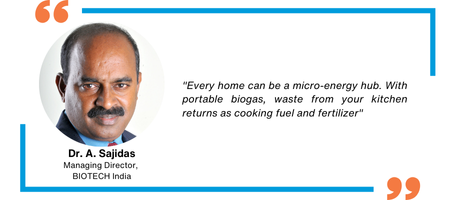
Dr. Sajidas presented BIOTECH India’s pioneering work on fiberglass-based portable biogas systems. Designed for both rural and urban households, these digesters are lightweight, easy to install, and remarkably efficient. The systems allow families to transform organic waste into usable energy and organic fertilizer, reducing dependence on LPG and mitigating landfill pressure.
In contrast, Thailand’s focus was on scaling biogas solutions at the industrial level. Dr. Ruttithiwapanich of BIOTEC Thailand emphasized the importance of customizing systems to local agricultural and industrial contexts, such as cassava starch and rubber processing. Thailand’s bioenergy roadmap aims to increase renewable energy use to 30% by 2037, with biogas as a central pillar.
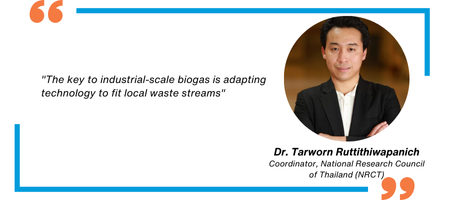
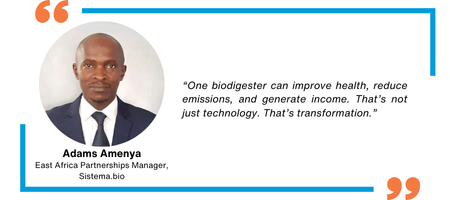
East Africa’s story was grounded in community impact. Representing Sistema.bio, Mr. Adams Amenya shared how biodigesters are changing the lives of smallholder farmers across Africa. Sistema.bio’s modular digesters not only provide clean cooking gas but also produce rich organic fertilizer, improving both nutrition and income at the household level. Their digital monitoring systems also track emissions reductions, tying local impact to global climate goals.
Long Yan from BIOMA, China brought in a systems-level perspective, showcasing large-scale biogas stations that provide fuel and fertilizer for entire communities. These projects integrate waste from livestock and toilets, offering a circular approach to rural development. Dr. Yan emphasized the role of policy, capacity-building, and South-South collaboration in scaling biogas solutions. From Samoa to Argentina, BIOMA has been exporting not just technology, but an ecosystem of training, standards, and partnerships.
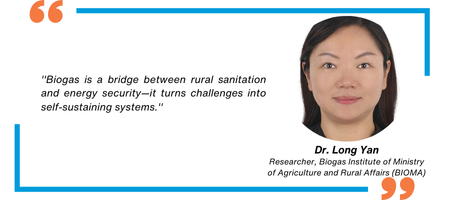
The webinar concluded with a powerful reminder: clean cooking is no longer a peripheral issue. It sits at the intersection of climate, health, environment and development. Biogas, in its many forms, is uniquely positioned to address all three.
As momentum grows, the CECC and its partners continue to promote high-tier clean cooking solutions like ethanol, electricity, pellets, and of course, biogas. The challenge now is to scale what works, adapt it to new contexts, and ensure that no household or community is left behind in the clean energy transition.
Watch the full webinar recording here: Webinar Recording: Innovations in Biogas Technology for Clean Cooking
The United Nations Industrial Development Organization (UNIDO) and the Council on Ethanol Clean Cooking (CECC) invite you to a webinar on “Innovations in Biogas Technology for Clean Cooking.” This session will spotlight recent advances in biogas technologies designed for household and community-level applications. Experts from across the biogas sector will present innovative approaches to system design, feedstock utilization, and deployment models that enhance performance, affordability, and user adoption. The webinar will also examine enabling policy environments and investment opportunities to support the scale-up of biogas for clean cooking in diverse contexts.
Save the date: The webinar will take place on May 21th at 13:00 CEST.
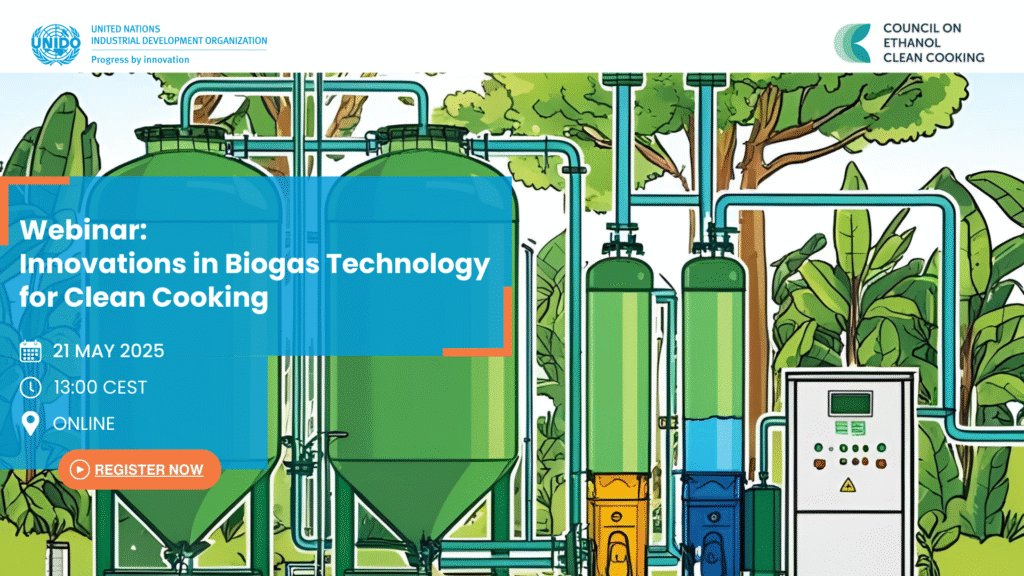
Kasulu & Buhigwe, Kigoma Region, Tanzania—April 10-11, 2025
Author: Alusaria Verande Nkya.
In a groundbreaking move to transform cooking practices across Tanzanian households, 50 teachers from nine secondary schools in Kigoma underwent transformative training on electric clean cooking stoves. The initiative, spearheaded by the United Nations Industrial Development Organization (UNIDO) in collaboration with SIDO and TANESCO, aims to empower both educators and students while promoting healthier, more eco-friendly, and cost-effective cooking methods.

A Recipe for Change: Why Clean Cooking Matters
More than 80% of Tanzanian households still depend on firewood and charcoal, causing deforestation, indoor air pollution, and significant carbon emissions. But there’s good news: Kigoma is now connected to the national power grid, benefiting from the Julius Nyerere Hydropower Station’s 2,000 MW surplus. This untapped energy can power cleaner cooking solutions for 4-5 million households—a recipe for environmental and health transformation.
Blending Theory with Practice
Over the course of two days, teachers combined classroom knowledge with hands-on training. Using Electric Pressure Cookers (EPCs) and Induction Hobs, participants discovered the impressive efficiency, safety, and speed these appliances offer. Preparing staple dishes such as ugali and beans revealed how little energy these stoves consume—e.g., cooking beans in just 60 minutes used a mere 0.26 kWh, costing only Tsh 100!
This hands-on learning experience not only highlighted the cost-saving potential of electric cooking but also delved into scientific concepts like energy, power, and heat transfer, connecting the dots between science lessons and real-life applications.
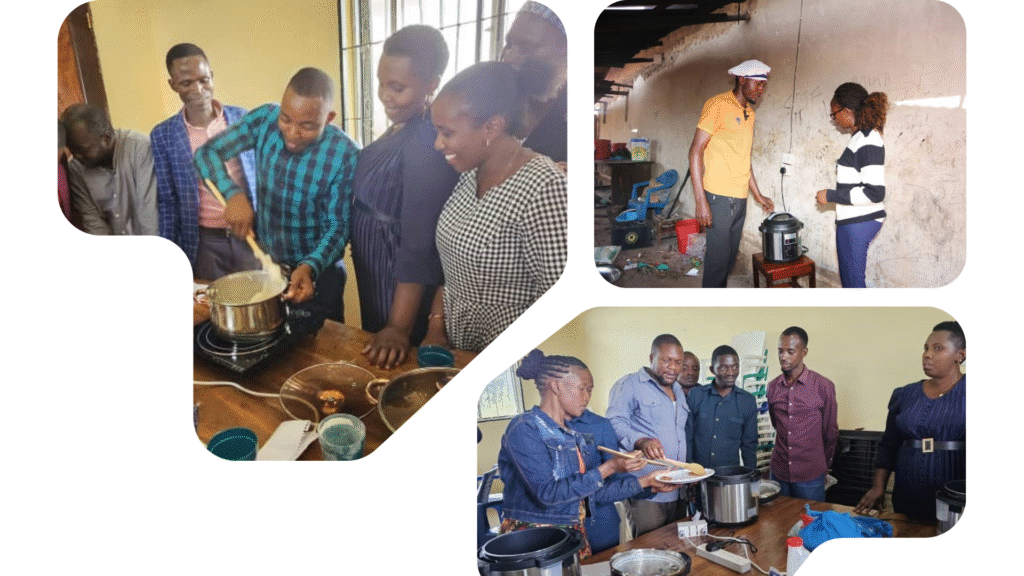
From Schools to Communities: A Ripple Effect of Change
The story doesn’t end in the classroom. On April 24, UNIDO will equip all 10 participating schools with EPCs, Induction Hobs, and energy meters, alongside detailed user manuals. Teachers will incorporate electric cooking into the science curriculum, ensuring students not only learn about sustainability but actively practice it in their lives.
Teachers will also track progress by submitting monthly reports on their students’ outreach efforts. As students spread this knowledge to their homes, this initiative is expected to ignite a region-wide transformation in cooking habits.
“Safety First!” Teachers Engage, Question, and Inspire
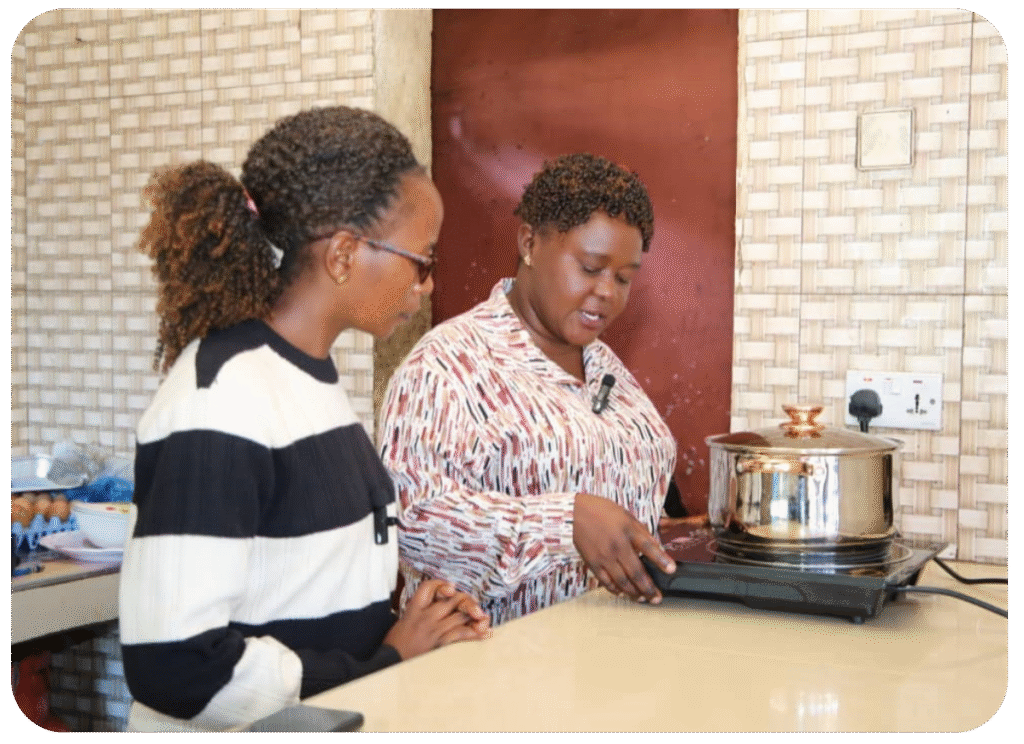
During the training, safety was a top concern for the teachers, many of whom had never worked with electric cooking appliances before. Facilitators addressed these concerns by emphasizing key safety features, such as automatic temperature controls. The response? Enthusiasm! Teachers are already calling for extended sessions to delve deeper into this critical topic.
A Unified Effort for Clean Cooking
The movement doesn’t stop here. During the training, safety was a top concern for the teachers, many of whom had never worked with electric cooking appliances before. Facilitators addressed these concerns by emphasizing key safety features, such as automatic temperature controls.
With teachers now acting as champions of this clean cooking revolution, Kigoma is setting the stage for a cleaner, healthier, and more sustainable future. This initiative is not just transforming the way we cook but it’s also showing how education and community engagement can spark meaningful, lasting change.
Ethanol has emerged as an important renewable fuel for clean cooking, offering a sustainable alternative to traditional biomass and imported fossil fuels. Its adoption has the potential to significantly reduce indoor air pollution, lower greenhouse gas emissions, and enhance energy security, economic development, and gender empowerment, particularly in developing countries.
However, the sustainability and scalability of ethanol for clean cooking largely depend on the availability, affordability and accessibility of ethanol for the consumers. In that context local production and availability of alternative and sustainable feedstocks to sugar cane, that do not compete with food security is crucial. Currently, major ethanol clean cooking initiatives in countries like Kenya, Tanzania, Uganda, Ghana, and others depend primarily on molasses from sugar industries. But for large-scale adoption of ethanol as a clean cooking fuel, it is necessary to explore diverse feedstocks, such as cassava, sweet sorghum, cocoa waste, cashew apple and invasive species such as water hyacinth. Each feedstock presents unique economic, technical, and environmental opportunities and challenges.
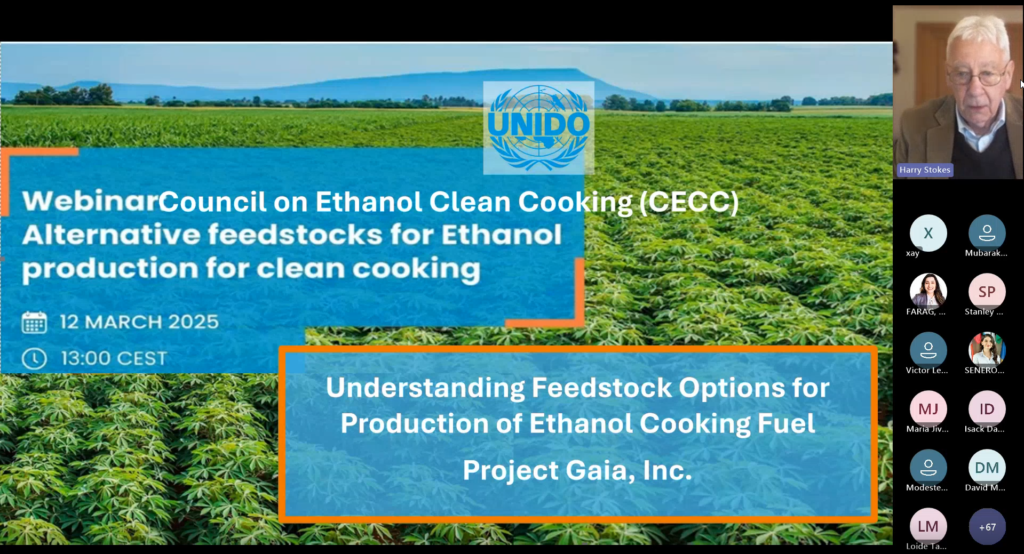
Harry Stokes emphasized the importance of local production of enzymes to reduce costs and improve ethanol processing efficiency. He also highlighted carbon credit mechanisms as a potential revenue source for ethanol projects, helping improve financial viability while promoting sustainability.
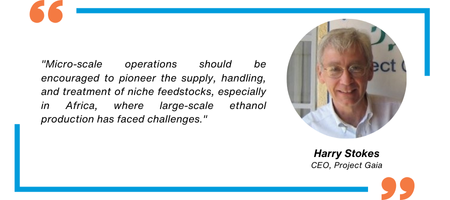
Victor Legogie shared insights from his 50,000-liter-per-day bioethanol project in Nigeria, which uses cassava as its primary feedstock. While cassava is widely cultivated and high in starch, he noted logistical challenges such as its high moisture content (70%), which affects storage and transport costs. His company aims to integrate ethanol production with biomass power, carbon capture, and animal feed production to create a zero-waste system.
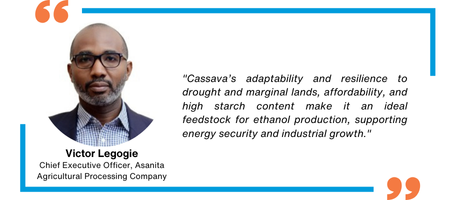
In Kenya, water hyacinth is an invasive species that clogs Lake Victoria, disrupting local ecosystems and livelihoods. Richard Arwa’s initiative converts water hyacinth into bioethanol, utilizing locally produced enzymes to break down cellulose into fermentable sugars. His micro-distillery model achieves 95% water recycling efficiency, demonstrating that small-scale ethanol production can be both economical and sustainable. His model of micro-distillery and fuel dispensing system with IOT tracking systems is poised for scaling.
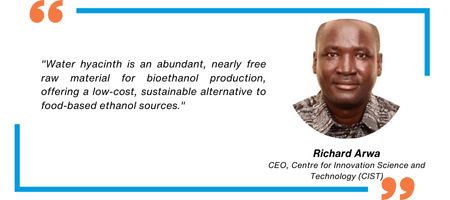
Hamisi Juma Tindwa discussed how Tanzania produces 2.3 million tonnes of cashew apples annually, yet most of it rots unused. His research aims to develop efficient collection and processing methods to convert this wasted resource into ethanol for clean cooking. Due to the short lifespan of cashew apples (around 70 hours before fermentation begins), innovative preservation techniques will be essential to make cashew-based ethanol a viable solution.
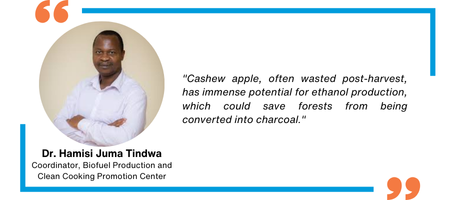
Stanley Alexander Phillipson explained that sweet sorghum is ideal for semi-arid regions due to its low water requirements and dual-purpose use—providing both grain for food and stalks for bioethanol. He stressed the importance of farmer adoption, irrigation efficiency, and sustainable land use practices to maximize yields and reduce costs.
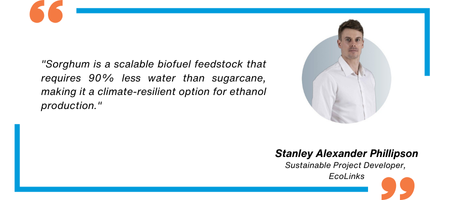
A key takeaway from the webinar was the crucial role of policy and investments in scaling alternative ethanol feedstocks. Strong regulatory frameworks, financial incentives, and strategic partnerships are essential to unlocking the full potential of feedstocks like water hyacinth, cashew apples, and sweet sorghum.
Summing up the discussion, Jossy Thomas (Project Manager, UNIDO) emphasized the broader impact of these efforts:
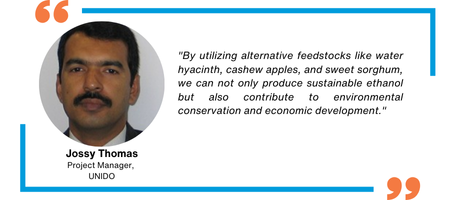
This webinar showcased innovative approaches to ethanol production and the importance of alternative feedstocks in making clean cooking more accessible and sustainable.
Watch the full webinar recording here: Webinar Alternative Feedstocks for Ethanol Production for Clean Cooking-20250312_134545-Meeting Recording.mp4
The United Nations Industrial Development Organization (UNIDO) and the Council on Ethanol Clean Cooking (CECC) invite you to a webinar on “Alternative Feedstocks for Ethanol Production for Clean Cooking.” This webinar will explore various feedstocks for ethanol production, including cassava, red sorghum, water hyacinth, and cashew apple. Industry experts and ethanol producers will share insights on business models, economic considerations, and policy frameworks supporting ethanol as a clean cooking fuel.
Save the date: The webinar will take place on March 12th at 13:00 CEST.
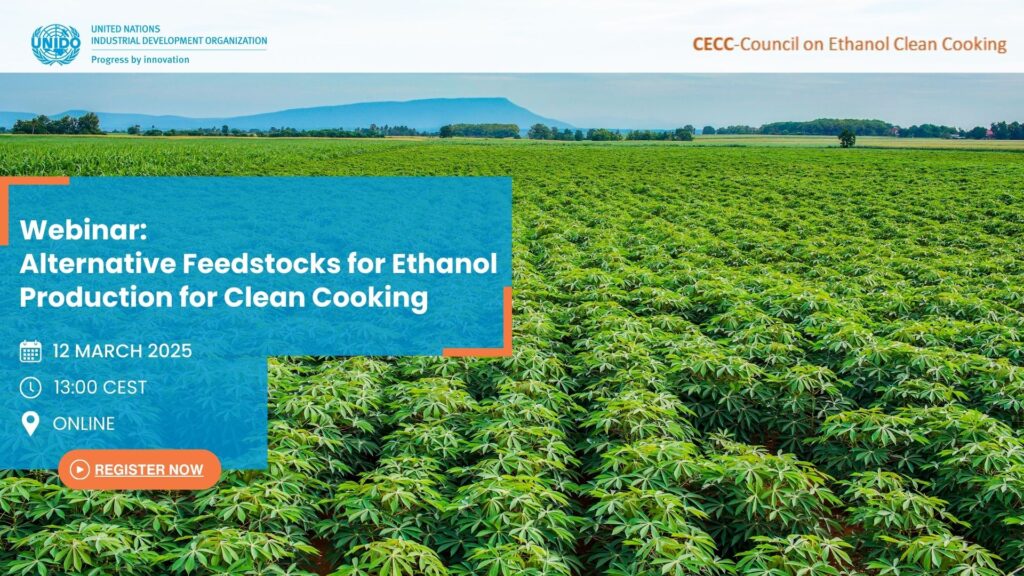
The United Nations Industrial Development Organization (UNIDO) is pleased to welcome the Brazil Africa Institute (IBRAF) as a new partner of the Council of Ethanol Clean Cooking (CECC). This partnership strengthens global efforts to promote clean cooking solutions, advancing sustainability, energy access, and women’s empowerment in developing countries.
As a new member, IBRAF brings valuable expertise in ethanol microdistilleries and sugar industry value chain development, particularly in Africa. By leveraging Brazil’s proven best practices and IBRAF’s extensive network, the Institute will support CECC’s mission to scale up clean cooking adoption through technical assistance, market creation, and knowledge sharing. This collaboration underscores the power of global partnerships in driving inclusive economic growth, environmental sustainability, and improved public health.
For more information, visit the Brazil Africa Institute: https://ibraf.org/clean-cooking-council/
Photo: Brazil Africa Institute
The Kigoma Regional Commissioner’s Office has extended its heartfelt appreciation to the United Nations Industrial Development Organization (UNIDO) for its continuous support and commitment to sustainable development, through provision of clean electric cooking equipment at Kigoma Girls Secondary School, which accommodates a total of 1,200 girls. This activity formed part of the successful implementation of a Kigoma Joint Programme, for Women’s Economic Empowerment
In a letter to the UNIDO Representative in Tanzania, the RC acknowledged how the project has contributed significantly to the well-being of students and staff at the school, providing a healthier and more conducive learning environment.

According to RC, the installation of electric cookers at Kigoma Girls Secondary School is a prime example of how sustainable energy solutions are transforming the region and requested scaling of clean cooking solutions to many other schools in the region. In addition, Kigoma’s Regional Administrative Secretary, Hassan A. Rugwa, added his thanks to UNIDO and stated that the Kigoma communities in general have taken note of the electric cooking solutions and look forward to similar sustainable electric cooking solutions.

Overall, the following benefits from the project can be highlighted:
UNIDO’s efforts are in support of the President’s initiative for a National Clean Cooking Strategy (2024-2034), aimed at environmental conservation and women empowerment. These efforts are not only improving the daily life of people in the region but also reducing the use of wood and charcoal in schools.
At COP29, the United Nations Industrial Development Organization (UNIDO) and the Council on Ethanol for Clean Cooking (CECC), in collaboration with the Vice-President Office of Tanzania and the Climate Finance & Energy Innovation Hub, hosted two important events focusing on clean cooking solutions. The sessions were designed to address the challenges and opportunities of scaling clean cooking technologies across Africa, with an emphasis on financing, partnerships, and national strategies.
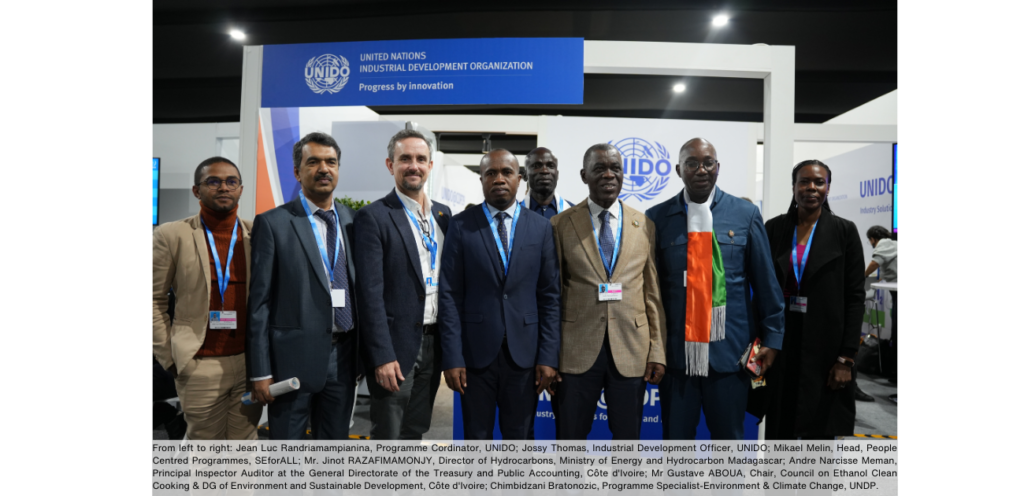
The first session, titled “Financing for Scaling Clean Cooking,” took place on 14 November 2024 and explored the essential role that financing plays in addressing Africa’s clean cooking needs.
One of the main highlights of the session was Tanzania’s National Clean Cooking Energy Strategy, which aims to provide 80% of its population with access to clean cooking solutions by 2034. This ambitious strategy is central to the country’s efforts to reduce reliance on traditional cooking fuels, which are harmful to both health and the environment. The session also reflected on the African Women Clean Cooking Support Programme (AWCCSP), launched by Tanzania’s President Samia Suluhu Hassan at COP28 in 2023. This program focuses on empowering African women, who are disproportionately affected by the health risks of traditional cooking methods.
The panel also discussed the urgent need for $8 billion in annual investments to achieve universal clean cooking access by 2030, with a focus on innovative financing mechanisms that can mobilize the necessary resources.

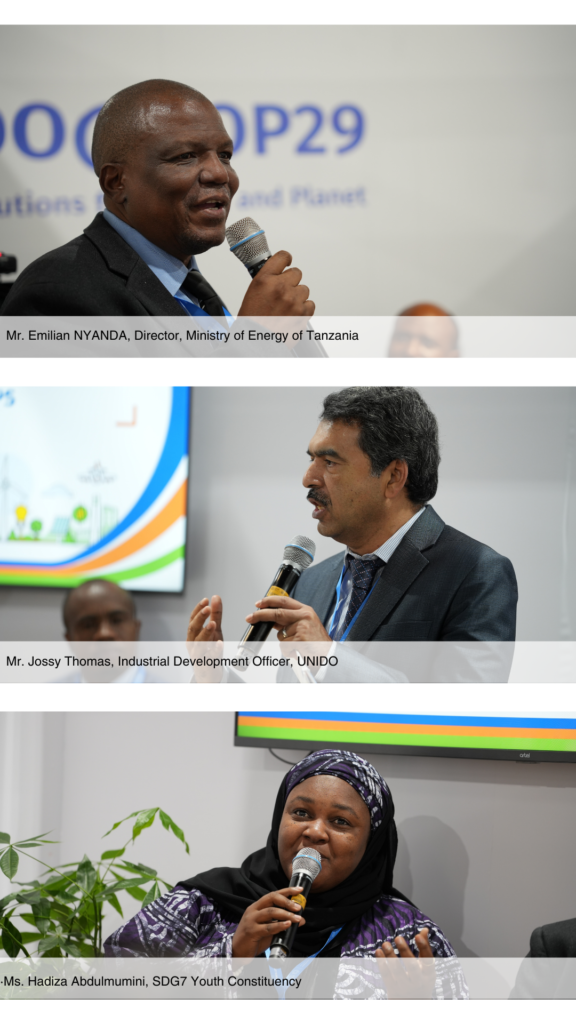
The second session, titled “Scaling Clean Cooking through Partnerships,” took place later on 14 November and focused on the role of partnerships in accelerating the adoption of clean cooking solutions. While progress has been made in expanding access to clean cooking, 2.1 billion people globally still lack access, with Sub-Saharan Africa being the region most affected.
To meet the clean cooking goals by 2030, the panel emphasized that an annual investment of at least $4 billion is required. The session featured senior officials from Tanzania, Côte d’Ivoire, and Madagascar, who shared their national clean cooking strategies and the challenges they face in scaling these solutions. The discussion also highlighted the importance of collaborative partnerships involving governments, international organizations, and the private sector to deliver sustainable solutions.
UNIDO’s Global Impact Programme was showcased as a model for scaling clean cooking solutions, with pilot projects already underway in Tanzania and Madagascar. New initiatives are also being launched in Mali, Burkina Faso, and Botswana to address the clean cooking needs in these countries. Panelists called for the integration of clean cooking solutions into national energy plans and emphasized the need for strong supply chains and local manufacturing to make clean cooking technologies more accessible and affordable.
On 15 November 2024, the COP29 Side Event titled “Renewable-Based Clean Cooking: An Opportunity for Climate and Development” was co-organized by IRENA and UNIDO. The session delved into the advantages and challenges of renewable energy-based clean cooking solutions. Panelists included experts from UNIDO, MECS, SNV, NEFCO, SCI, and ECC Advisory, who shared real-life examples of projects that are successfully deploying renewable cooking technologies in developing countries.
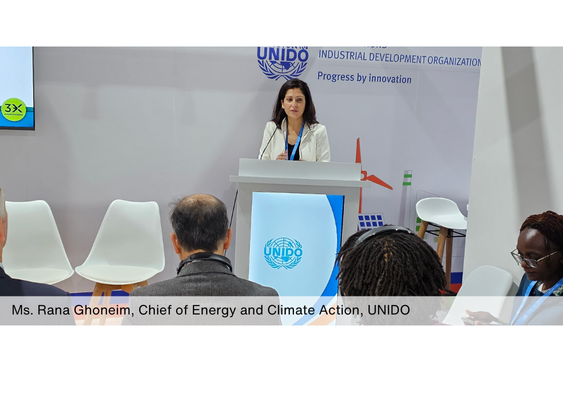
The panel emphasized that behavior change communication, as well as the affordability, availability, and accessibility of clean cooking fuels and technologies, are crucial for scaling clean cooking access. During her keynote speech, Ms. Rana Ghoneim, Chief of Energy and Climate Action at UNIDO, highlighted the critical importance of scaling renewable-based solutions for both gender empowerment and just energy transitions in developing countries.
The event was facilitated by Mikael Melin from SEforALL and moderated by Caroline Ochieng from IRENA. They discussed how renewable energy sources, such as ethanol and biogas, can provide scalable solutions that help reduce dependency on harmful cooking methods while contributing to climate goals.
One of the primary takeaways from the sessions was the urgent need for innovative financing mechanisms to bridge the funding gap. With $8 billion required annually to meet the clean cooking goals by 2030, new financial models are essential to mobilize the necessary investments. Governments and international partners must work together to create funding mechanisms that can attract private sector investment, ensuring that clean cooking solutions are implemented on a large scale.
Another key takeaway was the importance of partnerships between governments, international organizations, and the private sector. Collaboration across sectors is critical to scaling up clean cooking solutions. The experiences shared by countries like Tanzania, Côte d’Ivoire, and Madagascar demonstrated that when national governments partner with international organizations and the private sector, they can leverage resources and expertise to overcome the barriers to scaling clean cooking solutions.
Additionally, the sessions underscored the need for strong integration of clean cooking solutions into national energy plans. This includes making clean cooking a central component of energy strategies and prioritizing the development of local manufacturing and robust supply chains. Local solutions will be key to ensuring that clean cooking technologies are accessible and affordable for the most vulnerable populations.
Finally, the sessions highlighted that renewable energy-based solutions for clean cooking offer a unique opportunity to drive both climate action and development. By embracing renewable technologies such as ethanol, biogas, and other sustainable fuels, countries can address both health and environmental issues while empowering communities, particularly women, and ensuring a just energy transition.
With the support of partners like the OPEC Fund and SEforALL, and the continued collaboration with countries such as Tanzania, Côte d’Ivoire, and Madagascar, the momentum for achieving universal clean cooking access by 2030 is building. However, urgent action is required to ensure that clean cooking technologies become a reality for millions of people in Africa and other developing regions.
The clean cooking sector in Madagascar is undergoing a major revival after years of slow development. During a workshop held during 22 and 23 October 2024 in Antananarivo, MCCI – an association of clean cooking businesses was officially launched. This event was initiated under the joint leadership of the Ministry of Energy and Hydrocarbons, Ministry of Environment and Sustainable Development, and Ministry of Industrialization and Trade. The event brought together more than 200 participants from the clean cooking sector. *The United Nations Industrial Development Organization (UNIDO), the United Nations Development Programme (UNDP), Sustainable Energy for All (SEforALL), the World Food Programme (WFP) and World Wildlife Fund, supported the event.
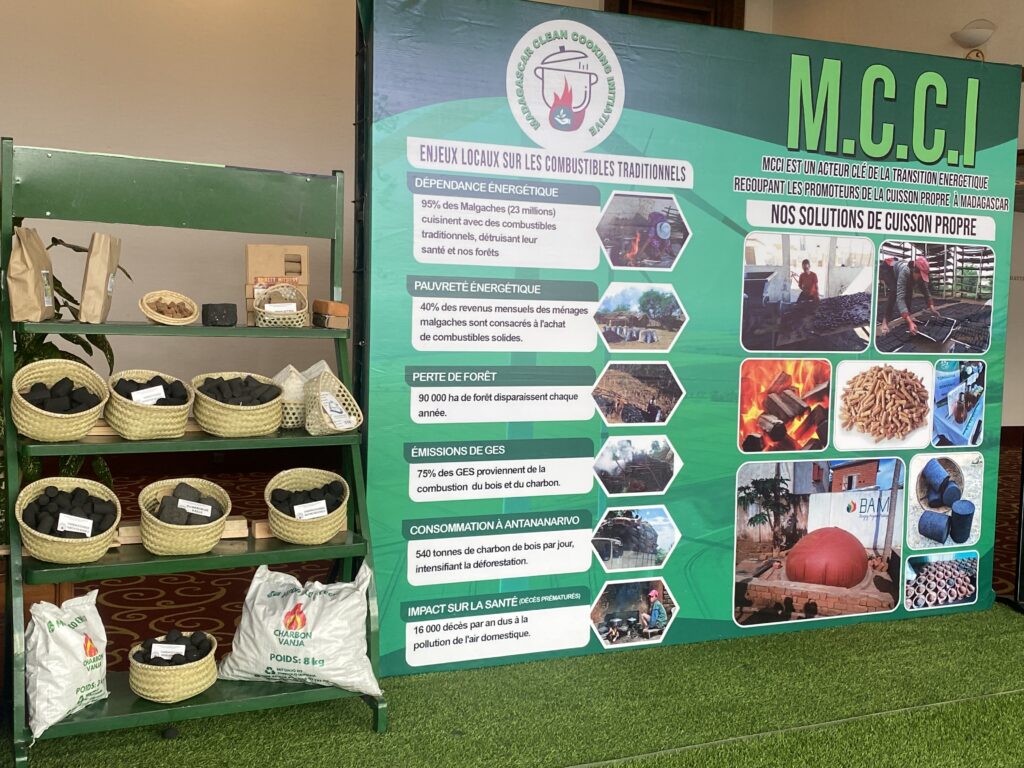
Madagascar is facing a unique energy crisis, with around 80% of total energy consumption based on biomass, 68% of which comes from firewood and 10% from charcoal. This dependence on traditional unsustainably harvested biomass fuels is having a serious impact on the environment, contributing to alarming levels of deforestation. According to forecasts, 25% of Madagascar’s forests could disappear by 2030, due to demand for wood and charcoal for cooking. Only less than 12% of the population uses clean cooking technologies or improved stoves, leaving the majority of Malagasy people dependent on traditional cooking methods, with negative impacts on the environment and health. Traditional cooking methods present a major risk to public health due to Indoor Air Pollution causing around 21,000 deaths a year, or 10.7% of the country’s annual deaths, a figure that includes many children under the age of five. Indeed, Indoor Air Pollution remains the leading cause of child mortality in the country, due to acute respiratory infections caused by smoke generated when cooking with wood or charcoal.
Madagascar Clean Cooking Initiative (MCCI) is a national association of 48 companies from 13 regions of Madagascar. This initiative, which was set up under the guidance of UNIDO, promotes modern cooking technologies such as green sustainable charcoal, briquettes, biogas, bioethanol, and e-cooking. The launch was formalized by the signing of a quadripartite agreement between the Ministries of Energy, Environment, and Industry and the MCCI, sealing a strategic partnership to accelerate Madagascar’s just energy transition.
The MCCI initiative is part of the ‘Technical assistance project for the development of a national clean cooking and reforestation programme for Madagascar,’ implemented by UNIDO with financial support from The OPEC Fund for International Development.
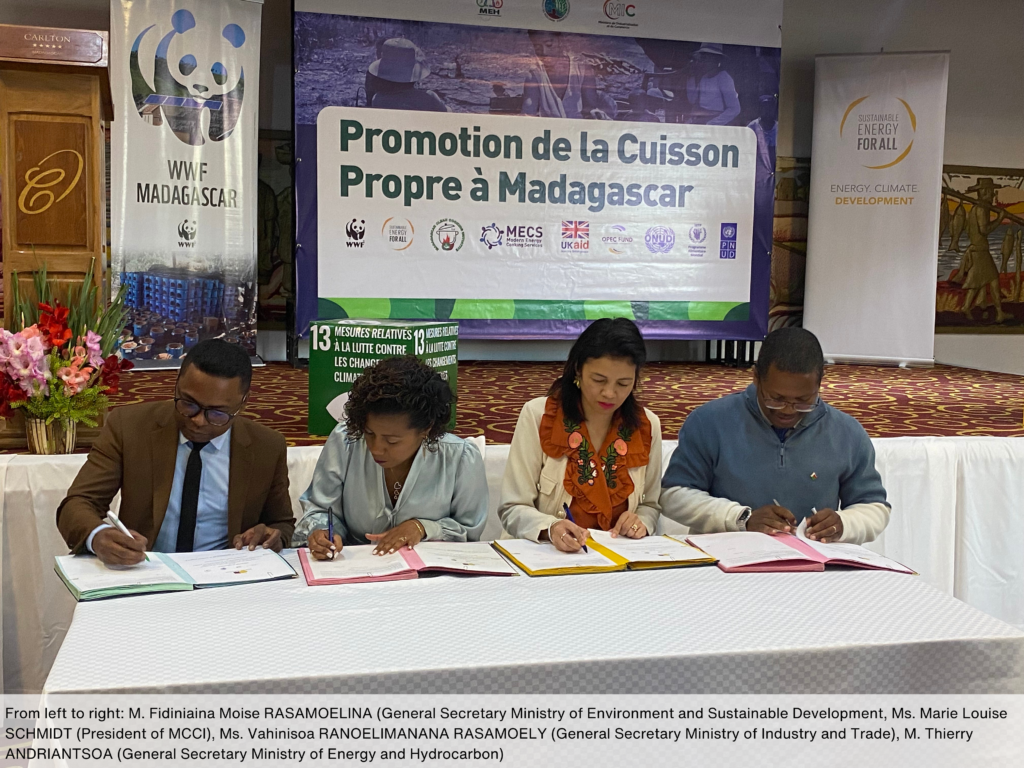
The event served to lay solid foundations for the future National Clean Cooking Policy, a project currently being developed by the Malagasy government. The policy envisages greater access to affordable modern cooking fuels technologies for Malagasy households by 2030, in line with the objectives of the New Energy Policy (2015) and the Nationally Determined Contributions (NDCs). The workshop also enabled participants to share best practices and articulate challenges in the sector, while highlighting the importance of public-private partnership to accelerate the adoption of modern clean cooking technologies.

Mrs. Marie Louise SCHMIDT, President of the MCCI, expressed an ambitious vision, which is to make Madagascar a model for clean cooking in Africa, thereby reducing deforestation, protecting the environment and public health, and improving the well-being of the Malagasy people – particularly women and children.
The launching of MCCI generated enthusiasm among clean cooking entrepreneurs. Since its launch, the Initiative has received twenty new membership applications.
This article is written by Jean Luc Randriamampianina.
“Imagine rural schools in Tanzania where students no longer waste time collecting firewood for cooking in schools. Instead, they enjoy nutritious meals prepared using eco-friendly stoves and non-carbonized briquettes from Hanny G. Investment”
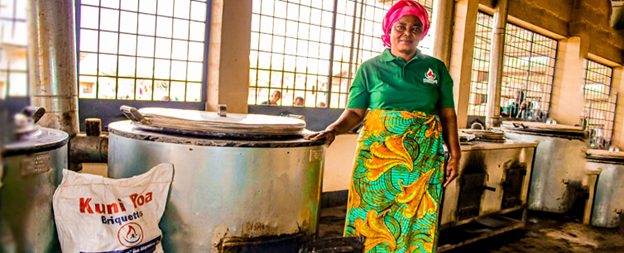
UNIDO is promoting the increased application of waste-to-energy technologies in agro-industries in Tanzania with financial support from the Global Environment Facility (GEF) and in partnership with several key national stakeholders in Tanzania – including the Ministry of Energy and the Vice President’s Office-Division of Environment (VPO). The project has established Bioenergy Incentive Fund (BIF), managed by Tanzania Development Bank (TIB) to facilitate scaling of bioenergy projects. Hanny G. Investment Company Limited is one of the beneficiaries of this program.
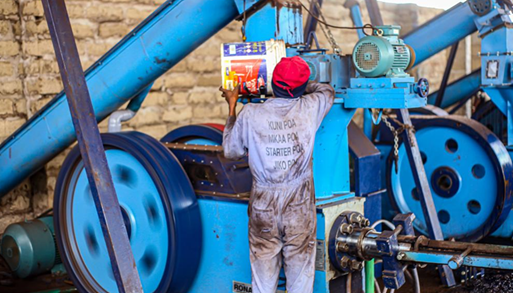
Hanny G. Investment Company Ltd is a women-led startup in Tanzania producing clean and affordable cooking fuels from bio-Waste and fabricates efficient cooking stoves for schools, food vendors, and households in Tanzania. The company has over 8 years of experience with over 5,300 institutional cookstoves using the briquettes were successfully disseminated and distributes over 18,720 tons of briquettes per year.
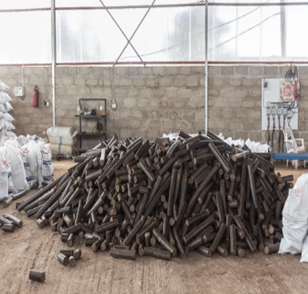
Currently, the company operates in 17 regions of Tanzania with over 500 schools and institutions as customers. The schools and institutions that shifted from firewood had saved up to 45% of their monthly expenditure for cooking fuel. Others have shifted from the use of gas to briquette due to high cost and maintenance. By switching to briquettes, these institutions are now saving over 25% on fuel costs. This reliable and clean cooking fuel is available year-round, solving the problem of finding and gathering firewood by students especially during the rainy season. The children no longer spend time gathering or chopping firewood, allowing them to focus more on their studies and personal development. With an average of 500 students in each institution and 30 staff, the company has been able to benefit more than 275,000 individuals across the country, ensuring they have clean cooking fuel and a healthy environment. Due to the high volume of bio waste (raw material), the company is looking forward to being able to recycle up to 36,000 Tons of waste per year by the end of 2025.
This article was contributed by Alusaria Verande Nyka.